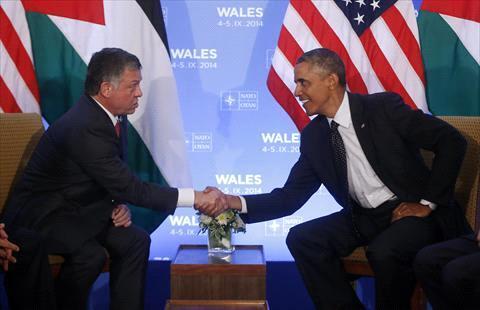Ammon News - AMMONNEWS - American allies including the U.K. and France said they would help form an international military coalition to fight a growing threat from Islamic State militants.
While members of the North Atlantic Treaty Organization meeting here on Thursday were weighing what role they would play, U.S. officials urged them to commit to a strategy that includes providing more arms to Kurdish forces fighting the Islamist insurgents in northern Iraq.
The American plan also entails choking off the financial resources the militants rely on to pay their fighters, curbing the flow of foreign extremists and backing Arab forces capable of battling Islamic State.
One of the most impassioned pleas at the NATO summit came from King Abdullah of Jordan, who implored world leaders to a "coalition of the committed" to fight Islamic State, said participants in the private meetings.
President Barack Obama's push represents the most ambitious U.S. effort to an international coalition to combat an extremist threat since President George W. Bush enlisted dozens of nations to fight al Qaeda and its Taliban allies in Afghanistan after the Sept. 11, 2001, attacks.
U.S. officials said they were expecting key NATO allies—including the U.K., France and Australia—to commit to the broader fight on Friday.
One European diplomat, however, said NATO itself shouldn't have a direct role in any military operations in Iraq. Instead the alliance is likely to be called upon to help coordinate efforts to deliver humanitarian aid and enforce controls along Iraq's porous borders. "NATO's role isn't operational [in Iraq]. It's a role of assistance," the diplomat said.
Obama administration officials said they weren't expecting NATO allies to immediately take part in airstrikes the U.S. has been conducting against Islamic State forces in Iraq.
The initial coalition effort is expected to focus on Islamic State forces in Iraq, because Syria's civil war has fractured the country. U.S. officials have said that the threat of the group can't be eradicated without targeting its strongholds in Syria. Mr. Obama has authorized surveillance flights over Syria, but hasn't yet decided on airstrikes.
It is unclear, however, if the U.S. can persuade many allies to eventually expand the effort into Syria. French officials say they are wary of taking the fight to Syria due to the chaotic nature of the country's civil war.
The U.S. has led the effort so far by launching limited airstrikes against Islamic State forces in Iraq, dropping humanitarian aid to besieged Iraqi communities, and creating a widening effort to arm Kurdish forces.
The beheading of two American journalists held by Islamic State fighters in Syria shifted the U.S. calculus, creating the urgency to mount a coalition. Mr. Obama is now calling for allies to defeat Islamic State militants.
As in Afghanistan, America's chief ally in the fight is the U.K. The militants who beheaded the two Americans have also threatened to kill a Briton in their custody, and on Thursday Mr. Obama and U.K. Prime Minister David Cameron urged NATO to take on the fight against Islamic State.
Mr. Cameron said the U.K. was considering joining the U.S. in launching direct military strikes against Islamic State fighters in Iraq. The U.K. is also reviewing whether to provide arms and training directly to Kurdish forces fighting Islamic State.
"We are considering actively whether to give them arms ourselves," Mr. Cameron said.
While Mr. Obama and Mr. Cameron led the appeal to summit participants, they were joined by top U.S. officials, including Secretary of State John Kerry, Defense Secretary Chuck Hagel, and Susan Rice, the president's national security adviser.
Before joining the lobbying effort, Lisa Monaco, the president's top counterterrorism adviser, said the U.S. strategy would also lean on intelligence sharing with allies, countering the group's sophisticated use of media, and law enforcement efforts to disrupt the flow of foreign fighters to and from the region. "If left unchecked," she said, the group "poses a potential threat to the homeland."
Mr. Kerry and Mr. Hagel expect to continue the lobbying effort later this week when they seek broader support across the region.
King Abdullah told NATO leaders that they had to make immediate decisions to stop Islamic State forces, according to participants in the meetings. Mr. Cameron met with the Jordanian king separately.
"It's very important that Western intervention isn't... done against the wishes and against the work of regional neighbors," Mr. Cameron said. "That is the mistake that's been made in the past."
The U.S. is looking to new alliances with Sunni tribes in Iraq to battle Islamic State forces, which have taken control of major cities.
It also wants to advance sluggish efforts to arm and train pro-American Syrian rebels so they can retake Islamic State strongholds in that country.
Mr. Obama was also planning to meet Friday night with Turkish President Recep Tayyip Erdogan, whose country shelters more than 800,000 Syrian refugees and serves as a conduit for militants heading to fight with Islamic State forces in neighboring Syria and Iraq.
*Wall Street Journal










 comment replay
comment replay 